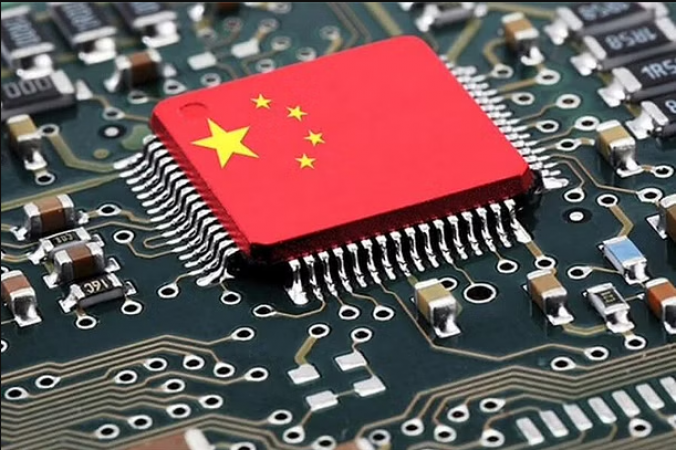
Beijing: The founder of a semiconductor start-up recently spotted the head of a well-known chip venture capital firm near an elevator at an industry event in Shanghai and seized the opportunity for a 60-second "elevator pitch". The venture executive turned around and walked away, making the entrepreneur uncomfortable.
The founder, who wished to remain anonymous due to the delicate nature of the subject, said: "I will soon run out of money if there are no new investments."
"It's not as easy as it was two years ago," he told the South China Morning Post, "when former US President Donald Trump first began banning the industry and gave semiconductor investment circles a huge boost in China."
Also Read:With its intrinsic services, Chati.Chat WhatsApp API tool becomes first choice amongst businesses
The start-up's founder is one of several Chinese chip entrepreneurs seeking refuge from the storm that engulfed the country's chip industry.
The early galvanization of the industry has given way to frustration in the face of US sanctions, after Washington tightened sanctions. All Chinese chip companies are currently preparing for a challenging year.
Dozens of Chinese tech firms, including Semiconductor Manufacturing International Corp (SMIC) and Hikvision blacklisted by Washington in 2020, accelerated chip manufacturing and design in China, as companies race to meet Beijing's demand for technological freedom . This drive helped Biren Technology, a chip design company, raise 4.7 billion yuan (US$648.5 million) in the first 18 months of its incorporation.
China added 592 new chip design companies in the past year alone, or about 11 new businesses each week. By the end of the year, there were 2,810 such businesses operating in Chinese cities with a focus on semiconductors, including Shanghai, Beijing, Shenzhen, Wuxi and Nanjing.
Since then, the situation has changed drastically. Four out of five executives at Chinese chip companies said 2023 would be worse than this year during a gathering at this month's Semicon China summit, adding that they are "getting ready for winter."
According to Liu Erzhuang, CEO of Productive Technologies, "Next year will be relatively slow, whether from a global or domestic point of view, so we have to improve our product."
He blamed the slowdown on the pandemic, rising US interest rates and a global chip glut, in addition to blaming geopolitics.
Following the recent escalation of chip shortages, Zhang Guoming, president of Shanghai-listed semiconductor equipment maker Haiting Technology, claimed that chip companies in China have predicted and are set for declining sales next year as projected by the global industry.
Also Read: Amazon India and TVS Motor collaborate to deploy EVs
Zhang's comments confirmed those of an executive at Atomic Nano-Materials and Devices in Nanjing, which manufactures semiconductor raw materials, who claimed the slowdown was forecast in "early March" this year.
According to Gartner's July 2023 forecast, a major boom cycle in the semiconductor industry will end abruptly in 2023 due to falling revenue, rising inflation and weak consumer spending. The research company lowered its forecast for revenue growth this year to 6.2%.
Richard Gordon, Gartner's vice president of practice, said in a report published in July that "although chip shortages are waning, the global semiconductor market is entering a period of weakness that will persist until 2023, when semiconductor revenues will grow by 2.5 percent." There will be a decline." Estimated percentage."
Future Horizons CEO, Malcolm Penn, forecast a 22% global decline in integrated circuit production in May, due to "a crumbling chip market combined with a global economic slowdown".
New US export controls implemented in October dealt another unexpected blow to the industry, as warning signs mounted.
A new set of export restrictions were imposed by the US Bureau of Industry and Security, a division of the Department of Commerce, on October 7 in an effort to limit China's access to advanced chips, the manufacture and maintenance of supercomputers. Production of advanced semiconductors for use in military applications, including the production of weapons of mass destruction.
The Commerce Department banned Nvidia and Advanced Micro Devices (AMD) from selling their most cutting-edge artificial intelligence (AI) chips to China, and the US Chips and Science Act was passed to support domestic chip manufacturing.
These actions were followed by the sanctions, which are seen as the most widespread and devastating sanctions ever targeting China's semiconductor industry.
According to Zhang, future investments in advanced manufacturing process nodes could be challenging due to the latest export restrictions.
The result was felt immediately. According to a report in the Financial Times, Biren, which claimed to have the ability to design chips more powerful than Nvidia, was forced to downgrade its chip performance to avoid export controls. .
A request for the result was realized immediately. According to a report in the Financial Times, Biren, which claimed to have the ability to design chips more powerful than Nvidia, was forced to downgrade its chip performance to avoid export controls. . Biren's request for comment was ignored.
Chinese chip design companies must maintain their international supply chains as they rely on more sophisticated manufacturing facilities operated by companies such as Taiwan Semiconductor Manufacturing Company (TSMC).
This month, a media report claimed that HiSilicon, Huawei Technologies' internal chip division, would be able to manufacture the company's state-of-the-art Kirin smartphone chip by 2023.
Additionally, wafer fabs and chip-making equipment companies, especially those with advanced node focus, are dealing with the effects of the restrictions.
According to the company's partner and CEO Jing Xiao, one of the equipment companies Shanghai Haiwang Fund Management has invested in has seen orders of "straight decrease by 20%".
As export controls slow the pace of expansion and new plant construction, wafer fabs may also face a reduction in production capacity, Xing said.
Also Read: 7 Updates That Have Been Confirmed for the Tata Harrier
The effect could soon accumulate in many different domains. Lack of investment, decreased revenue, and reduced orders can push some businesses into bankruptcy.